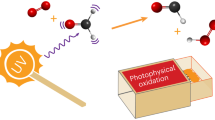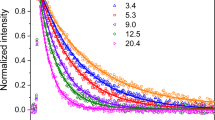Abstract
THE thermal decomposition of formaldehyde1 and of acetaldehyde2 can be represented by x—t graphs which indicate a period of rapid decomposition, followed by one of slow decomposition. The experimental results of Spence3 for the rates of oxidation of formaldehyde appear to be represented by similar graphs, indicating a similarity in the processes. Seddon and I have pointed out4 that, in the case of acetaldehyde, the total rate of thermal decomposition appeared to be independent of all conditions except temperature and initial concentration, the nature of the final products, whether methane and carbon monoxide on one hand, or propylene, carbon dioxide and water on the other, being materially dependent on certain other conditions.
This is a preview of subscription content, access via your institution
Access options
Subscribe to this journal
Receive 51 print issues and online access
$199.00 per year
only $3.90 per issue
Buy this article
- Purchase on Springer Link
- Instant access to full article PDF
Prices may be subject to local taxes which are calculated during checkout
Similar content being viewed by others
References
Fletcher, Proc. Roy. Soc., A, 146, 357.
Travers, and others, Proc. Roy. Soc., A, 146, 250, and in the press.
J. Chem. Soc., 649 (1936).
NATURE, 137, 906 (1936).
Author information
Authors and Affiliations
Rights and permissions
About this article
Cite this article
TRAVERS, M. Kinetics of Gas Reactions: an Attempt to Connect Thermal Decomposition and Oxidation Processes. Nature 138, 26–27 (1936). https://doi.org/10.1038/138026b0
Issue Date:
DOI: https://doi.org/10.1038/138026b0
Comments
By submitting a comment you agree to abide by our Terms and Community Guidelines. If you find something abusive or that does not comply with our terms or guidelines please flag it as inappropriate.



